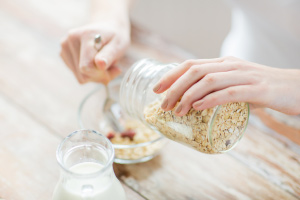

“Protein” simply refers to a macronutrient which is made up of amino acids and plays a crucial role in repairing and building tissues, thereby supporting multiple body functions. One has to take a proteinaceous diet in order to stay healthy. “High protein diet”, on the other hand can be a better choice for those who want to increase their daily intake of protein if compared with standard protein intake. Also, high protein diets support weight loss and usually target 100 grammes of protein per day. This is one of the reasons why this diet is trending amongst fitness freaks and those who are targeting to get toned and lose weight.
This article will discuss the science behind a high protein diet for weight loss, how they can help you lose weight, and some easy ways to add protein to your meals.
What is a High-Protein Diet?
A high protein diet for weight loss simply means eating more protein and fewer other macronutrients like fats and carbs. Protein helps build muscles, heal cells, and make important hormones and enzymes. It can also help you feel full for longer, which is a big part of controlling your weight.
How Does Protein Help You Lose Weight?
Protein does more than help you build muscle; it also enables you to lose weight in several important ways. It helps in these ways:
Long-lasting Fullness
Protein makes you feel full longer because it takes your body to process. This might make you less hungry between meals and keep you from eating too much. Research has shown that people who eat a lot of protein tend to eat less and lose weight faster. A high protein diet for weight loss helps you stick to your calorie goals because it keeps you from getting hungry.
Lean Muscle Mass Preservation
You don’t just want to lose fat when you lose weight; you also want to keep your lean muscle mass. Protein helps your muscles stay strong while you lose weight. It is very important to do this because lean muscle burns more calories than fat. This can speed up your metabolism and help you lose fat. In addition to promoting fat loss, a protein diet for weight loss can help avoid muscle breakdown.
Burns More Calories
Thermic effect of food (TEF) is the number of calories your body burns as it breaks down, absorbs, and stores food. Protein burns more calories than fats or carbs, so your body burns more calories by breaking down protein. Adding this to your daily routine may make you burn more calories, which can help you lose weight as part of your high protein diet plan.
Decreases Fat
Protein is more difficult for the body to turn into fat than fats and carbs. Even if you eat a little extra protein, your body is less likely to store it as fat. This is good news if you want to keep your fat stores as low as possible, especially around your belly. If you follow a high protein diet plan to lose weight or try eating more protein, your body will probably store less fat.
How Much Protein Do You Need for Weight Loss?
Protein needs depend on your age, gender, exercise level, and health. To reduce weight, protein should make up 10% to 35% of your daily calories. If you eat 2,000 calories, aim for 50–175 grammes of protein.
For your protein diet plan to help you lose weight, eat smaller meals throughout the day. Your body can only handle 25–35 grammes of protein at once, so consuming it in smaller amounts more regularly can assist. People who are very busy or involved in sports need more protein. Protein helps people build muscle and heal from workouts. An active person needs about 1 to 1.5 grammes of protein per pound of their goal weight. If you’re following a protein diet for weight loss, make sure to change your protein intake based on your level of physical exercise.
Healthy Sources of Protein
Lots of different plant and animal-based foods are high in protein and can be part of a high protein diet for weight loss:
Animal-Based Protein:
- Eggs (whole eggs or egg whites)
- Dairy (milk, cheese, yoghurt)
- Fish and seafood (salmon, sardines, trout)
- Lean meats (chicken, turkey, lean beef)
Plant-Based Protein:
- Legumes (lentils, chickpeas, kidney beans)
- Nuts and seeds (almonds, chia seeds)
- Tofu
- Quinoa
How Much Protein Do Active People Need?
Physically active people may require extra protein to exercise and recover health. Athletes and people who work out a lot should aim for 1 to 1.5 grammes of protein for every pound they want to lose. This helps you lose fat and build strength at the same time. Talking to a doctor or chef about your activity level and health goals will help determine how much protein you should eat. Due to different nutritional needs, each protein for weight loss female may differ slightly. This is why personalised plans work best.
Conclusion
A high protein diet for weight loss can be beneficial when paired with a healthy diet and regular exercise. Protein makes you feel full longer, keeps your lean muscle mass, burns more calories, and stops your body from storing fat. It is always a good idea to discuss your high-protein diet plan with a doctor or chef before making big changes to your diet. This way, you can make sure that the plan fits your needs and goals. Whether you’re an exercise fanatic or just starting to lose weight, eating more protein for weight loss may help.




